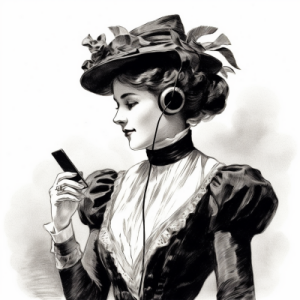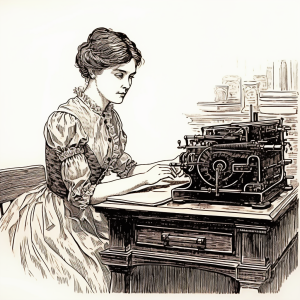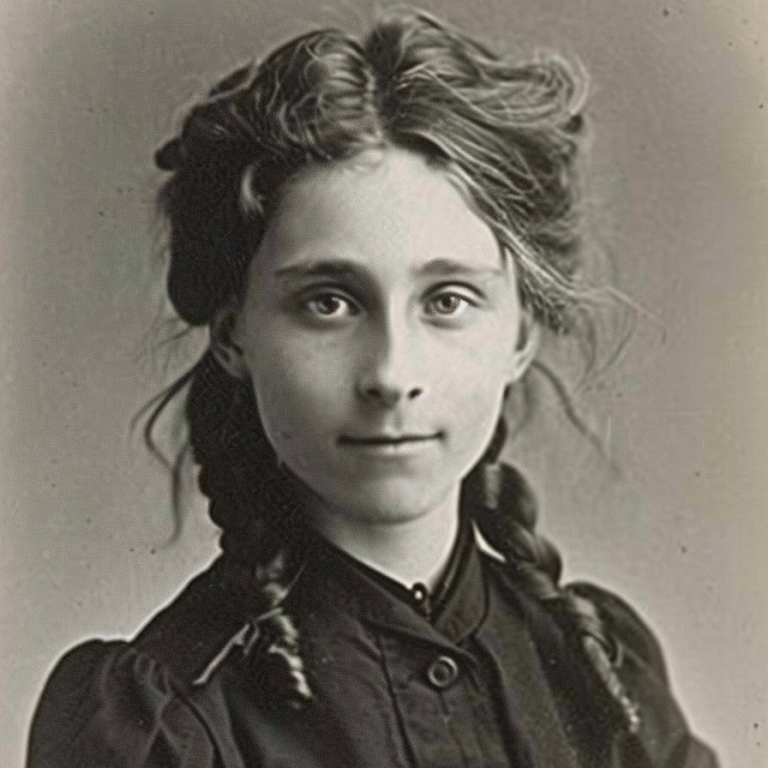CHAPTER VI.
PARLOURMAID TO MRS. BROWNLOW.
MRS. BROWNLOW’S residence was a pretty little house in Kensington, with the name “Elsmore Lodge “done in gold letters over the highly-polished dark green door. The brass bells, knocker, and letter-box shone out like new mirrors, and, as I stood waiting for my ring to be answered, I could see my reflection in the door-plate. The great wide hall into which I was admitted by the housemaid seemed to have been newly carpeted for the winter, and bright-coloured rugs were strewn about the floor. The housemaid, who informed me that her name was Alice, told me that Mrs. Brownlow had gone out to dinner, and had instructed her to show me to. my room. I had already, on the preceding Sunday, been shown through the house by Mrs. Brownlow, who said that, of course, I must see the house before I could tell whether I would like the situation; but Alice thought I had better take another look over the place, and to humour her I followed her from one room to another.
On either side of the front hall there was a large room, one the dining-room, the other the library. The dining-room was covered with Japanese matting, with a large crumb-cloth in the centre, and other rugs scattered about. The furniture was of beautiful old English oak and leather, and many pictures of game, fruit, fish, horses, and dogs hung on the wall. In a corner Alice called my attention to a lift, connecting the kitchen and dining-room. She explained that, before laying the table, I was to put all the china on the lift and draw it up, and that the cook would send up the meats and vegetables just as the family sat down.
“You’ll have to toe the mark if you keep this place,” said she confidentially. “Missus sent the last parlourmaid away because she didn’t make the glasses shine and broke so many dishes. Just before she left she broke a big punch-bowl and a lot of cups, and never told. Missus found it out a few hours before she went, and took out a part of her wages for it. It was a shame, wasn’t it?”
“Why, no, I don’t think so. What right had she to break the dishes and not say anything about it ? And, besides, if it was her fault, she ought to pay for them,” I answered, for the moment putting myself in Mrs. Brownlow’s place and feeling that I should have done the same thing under similar circumstances.
A very unpleasant look gathered on Alice’s face as I said it.
“Oh! so you take the part of the missus against the servants, do you ? I don’t.”
From that time I knew I had an enemy.
We went into the library, which was decorated in Oriental style. There were pictures, books, newspapers, magazines, two writing-desks, and a large music-box in a corner, which, after Alice had set it in motion, played me a merry welcome to my new situation. Up the wide staircase, padded and carpeted so that no footfalls could be heard, we went to the drawing-room on the first floor. The room was not so elegant nor so large as that at Mrs. Allison’s, but it was pretty and homelike, with the appearance of having been furnished more for comfort than display. Mrs. Brownlow’s bedroom came next—a veritable bower of pink. The dressing-table, I noticed, was at the side of the window, and not in front, as is the usual custom. Adjoining this room was the sewingroom, which, Alice said, would also be used by the maid as a sleeping-room, as Mrs. Brownlow had made some changes in order to give me a bedroom to myself. On the next floor was the bath room in which was a gas geyser, a bedroom for Miss Brownlow, the daughter of the house, Mr. James Brownlow’s room, and two servants’ rooms. The room occupied by Alice and the cook was a large, comfortable place with red ingrain carpet on the floor. There were two toilet-tables and bureaus combined, with separate washbowls, soap-cups, &c, bright pictures on the walls, and no religious mottoes. Then I went into my own room, a snug little place which Mrs. Brownlow had just fitted up for me. It was very cosy, had fresh carpet, and a nice clean set of single bedroom furniture. The little bed had a good mattress and springs, and was covered with a spotless white quilt. Under the mantel there was a small gas-grate. Alice told me there were no coal-fires in the house, and that even the cooking was done by gas. Each room had a gas-stove in the grate, and it was only required to strike a match to light the fires. She added, however, that, for some reason, Mr. Brownlow did not quite like the gas-fires, and was negotiating with a stove company to build and put up a large furnace in the cellar, and thus heat all the halls and rooms by registers, after the American plan. On my first interview Mrs. Brownlow had told me that the servants were allowed to have fires in their rooms in the morning and evening, and when changing their dresses in the afternoon, provided they were always careful to turn off the gas when they went to bed or left the room.
As I put away the few clothes I had brought with me, Alice stood waiting for me.
“Where’s your box?” she asked, noticing my very small handbag.
“It is at my lodgings in Camberwell. I thought I wouldn’t go to the expense of bringing it here till I knew whether I would suit Mrs. Brownlow. I’ve never been in service before, you know,” was my answer.
In the basement, Alice took me about and showed me the various china cupboards, and the pantry where I was to wash the glass and silver. As none of the family were at home to dinner, I had no waiting at the table. At eight o’clock we had our own dinner, which consisted of a joint, potatoes, brussels sprouts, and a boiled pudding. There were four of us—Sarah the cook, Janette the French maid, Alice, and myself. We had plenty of dinner, which was well-cooked and nicely served, and I learned that usually the family and the servants had the same food. The table was spread in a comfortable little room off the kitchen, and the knives, forks, and spoons were not of the peculiar brassy variety supplied to the servants at Mrs. Allison’s. Sitting opposite to Alice, I had a good opportunity to study her. She was tall, with a pretty face and trim figure, but she had the appearance of being treacherous and dishonest, and I wondered how she had managed to remain in her situation so long. Janette I liked very much better, and the cook seemed a pleasant, good-natured sort of woman. After dinner Alice went up-stairs to tidy the rooms, and I remained in the kitchen until about half-past nine. I watched the cook wash up the dishes, and saw that she did the work after the manner of Annie and the cook at Mrs. Allison’s. The cooking utensils were not washed at all, but put up on the scullery table to remain until the next morning. The dishes rattled together in the pan, and chip after chip came of! through her careless manner of handling them.
When Mrs. Brownlow returned, I was asked to go to her room. She was particularly kind in her manner of treating me, not in a patronising way, but as one woman talking to another who was less fortunate than herself. Although she evinced more interest in my previous history than had Mrs. Allison, she asked all her questions with tactful delicacy. She said she was anxious that I should think of her as much in the light of a friend as a mistress, although she paid me money for the work I was to do, and expected it to be well done. She explained that in employing me she was making an experiment, and, \{ she found it a successful one, she would make an entire change in her staff of servants, and engage girls of education to take the places of the cook and housemaid.
“I have given you a bedroom alone,” said Mrs. Brownlow, “because I thought you would find it much pleasanter to keep to yourself. You will probably want it quiet for reading and writing in the evening and on Sunday.”
I fully appreciated Mrs. Brownlow’s thoughtfulness in regard to the bedroom, although I could not help regretting that, under the circumstances, I would not be able to hear the night gossip of the cook and housemaid. Before leaving I was given the following list of the parlourmaid’s duties :—
“Rise at seven o’clock, and be ready for the servants’ breakfast at 7.15. Afterwards sweep and dust the front hall and drawing-room, lay the table for the nine o’clock breakfast, wait at table and clear away, attend to the glass and silver, light gas-fires in drawing- and dining-rooms, sweep and dust the dining-room, clean the lamps, lay the table for one o’clock luncheon, clear away, prepare for dinner and wait at table. After each meal shake the crumb-cloth, and answer the door during the day. Always to be dressed in time for luncheon.”
Besides this daily round, a part of each day in the week was to be given to some special work, such as turning out the drawing-room, dining-room, cleaning silver, &c. On Saturday I was to assist the housemaid in airing and repairing the table and bed linen, the needlework of the family being done by the ladies’ maid. I was to have an afternoon off each week, and be allowed to go to morning or evening service on Sunday, if I desired. On Sunday it was arranged that each servant should have half the day to herself, and the cook had every Sunday afternoon off, a mid-day dinner being served, and either Alice or I preparing and clearing away the eight o’clock supper.
Mrs. Brownlow’s list did not terrify me as Mrs. Allison’s had done, for the amount of work required was not unreasonable, and there was no starting with the day’s work without breakfast. Mrs. Brownlow told me she had experienced considerable trouble in regard to the cleaning of knives, blacking of boots, and scrubbing the front step, each servant declaring it was the other’s place to do these things, until finally she had procured the services of a member of the Houseboy’s Brigade, who came every morning to do this work, while once a week a larger boy from the same place washed all the windows in the house. It seemed to me most disgraceful that there should have been rioting in the kitchen over a few knives and boots. With such a small family and convenient house, three servants should have done the work easily. I told Mrs. Brownlow that I was perfectly willing to clean the knives and the boots, but she only smiled and said—
“We will wait a few weeks and see how things turn out.”
That night, comfortable as my bed was, I did not soon go to sleep, for Mrs. Brownlow’s kind face and gentle manners were always in my mind, and I began to think over a plan by which I might supply her with a good servant when I left, provided, of course, everything should prove satisfactory on both sides.
At 7.15 the next morning we sat down to the kitchen breakfast, which consisted of fried bacon, potatoes, toast, and coffee. I complimented Sarah on her tasty way of cooking, and she smiled benignly, saying that she had been a professed cook for ten years, and hoped she did know something about her business. William Johnson, the brigade boy, came in about 7.30, and the cook, remarking that she supposed he was as hungry as usual, put a large plate of bread-and butter and a cup of coffee before him with the knives and boots. I had seen hungry boys before, but I really never came in contact with a growing boy who had such a capacity for bread and coffee as William Johnson. In six minutes he had disposed of five large thick slices of bread and three cups of coffee.
“Don’t you have any breakfast before you go to work?” I asked.
“Yes’um, at half-past five, but I gets hungry again,” was his reply.
In half an hour I was ready to sweep the drawingroom, while Alice started to clean the stairs and landings.
“The other parlourmaid always swept the front hall first, and I think it’s the best way,” she observed as I opened the drawing-room door, with broom and dustpan in hand.
“I should say that was a very bad way,” I answered. “What is the use of my sweeping the front hall while you sweep the stairs and landings above ? Some of the dust would drop down, and you would dirty it as fast as I cleaned it. You sweep while I attend to the drawing-room, and I’ll do the hall afterwards.”
She looked very snappish, and declared she did not approve of new-fangled notions, and what was the difference anyhow, so long as I could say I had done it ?
In laying the breakfast-table I found that all the glasses were smeared and covered with finger marks, while the silver looked as if it had never been properly washed. There was egg or paste, or something of the kind, between the prongs of every fork. I was aware that in many instances parlourmaids overcame these difficulties by using their aprons as towels; but, not quite approving of that plan, I sent the things down on the lift and washed them again. After breakfast, looking on my list, I saw that Friday was the day for cleaning the silver. Mrs. Brownlow informed me that Clara, my predecessor, had always left the powder in the crevices of the plate, declaring she could not remove it, however much she brushed, and added, “I hope you will find a way of getting it off.” After rubbing it I washed and brushed it in hot water with soap and ammonia, which removed every particle of white dust. Mrs. Brownlow was so pleased with the result that she avowed her intention of making me her deputy-housekeeper.
“You see,” said she, “I am so interested in my painting and music that I do not like to keep my mind too much on household matters, but I do want everything clean and nice.”
I did not tell her how fully I appreciated her situation, nor of my unfitness for the position of housekeeper.
When I attended to the lamps, they looked as if they had not been well trimmed and cleaned for the past few months. The “wicks were crooked and crusted, while the ventilating burners were completely filled up with lampblack and dirt. After vainly trying to remove it with a pin and brush, it occurred to me that the only possible way to get rid of it would be to boil all the burners. So I put them in a saucepan on the stove, with plenty of hot water and soda, and in an hour they came out bright and clean. As I was putting the chimneys in a basin preparatory to washing them, Alice made some excuse to come into the pantry, and said she never had seen such goings on as stewing lamp-burners and putting chimneys in water, which was sure to break them. They should be cleaned with a cloth and chimney-brush. As I paid no attention to her, she soon left me, and expressed her opinion to the cook of “them smart girls that knows so much.” At dinner I had the satisfaction of overhearing Mr. Brownlow remark to his wife, “That girl’s a jewel! See the chimney how it shines, and not a particle of odour about the lamp!”
It was with considerable consternation that I attempted to open the first bottle of wine at the dinner-table. I had practised parlourmaiding to some extent before I left home, and had proudly acquired the knack of folding serviettes in the shape of a slipper, but try as I would I had found myself unable to manage a corkscrew. Had I been permitted to go into the hall with the bottle, I think I might have accomplished the feat a little more satisfactorily. The cork broke off, and at last I was obliged to push the remainder of it into the bottle, and a part of the contents came whizzing up in my face. After that accident it seemed to me everything went wrong, and I several times had to stop and ponder over which was my right hand and which my left, and put myself exactly behind the person I was? serving before I ventured to put down a plate or a knife and fork. I could have wept for joy when I heard Mr. James Brownlow remark, “Mother, I don’t mind opening the wine hereafter. I think it is rather hard work for a girl.”
The next day, after I had opened the door for a visitor, Mr. Brownlow met me in the hall, and said,
“Lizzie, do you know the difference between a friend of the family and a bill-collector?”
“Yes, sir, I think I do,” I replied, remembering that in my own experience I had often found a very painful difference between the two.
“Well, now, you must not let any collectors get into this house for the next month. I’m in Paris, see ? Don’t wait till they tell you what they want, but you must be able to spot them on sight, and say at once I’m not in London. That last girl of ours got me in more trouble by her stupidity in letting tax-gatherers and dressmakers and tailors in the house. Said she didn’t know how she was going to tell what they wanted when they wouldn’t give their business. To be a good parlourmaid you must be a mind-reader, and you look as if you could do something in that line.”
I bowed my acknowledgment of the compliment, and promised to do my best. I knew that in order to fulfil my part of the compact I must bring to play all my native powers of discernment. If I had had small tradespeople to deal with, my task would have been an easy one; or, if all bill collectors had been accommodating enough to wear pot-hats, I might still have experienced no difficulty. Mrs. Brownlow had told me, when she engaged me, that, after the first month, she would increase my wages^and had let drop a hint that her husband, a stockbroker in the City, was at present a little short of money because of the hard times in America, where he was largely interested in certain securities; so I had no difficulty in understanding Mr. Brownlow’s objection to a particular class of visitors.
Half an hour after my conversation with the head of the house the bell rang, and I opened the door to a tall, handsome-looking man, having all the appearance of belonging to the gentry. It was only about 10.30, and I could not believe the man had come to make a party call at that time in the morning, so when he asked for Mr. Brownlow I said, “He’s gone to Paris; but will you please tell me your business?”
“Oh, no, it’s not necessary; I’ll see Mrs. Brownlow. She will do quite as well.”
Now, I had been warned against men who would not tell their business, and I said, “She’s gone to Paris, too, and won’t be back for a month.”
“Well, it’s a fine performance; that’s all I’ve got to say,” was his answer, as he turned to go.
“Won’t you leave your name?” I asked.
“No,” he replied, rather savagely, and walked out.
I congratulated myself on my prowess, and went up-stairs to describe the man to Mrs. Brownlow, when I discovered that I had turned away the wrong man. Still, I was not disheartened by my first failure, and after two or three days’ practice I became quite an expert in that line. The experience I thus gained was not only of immense service to Mr. Brownlow, but will probably prove of great value to me personally.
In a few days I had become quite accustomed to my duties, and I felt that the position of parlourmaid at Elsmore Lodge was not a hard one. Mrs. Brownlow was one of the most considerate women I had ever met, and tried in every way to make her servants comfortable; but neither the cook nor Alice showed any appreciation of her kindness. Both of them were continually on the defensive, and seemed to believe that mistress and servant must necessarily look upon each other as enemies. Sarah cooked well, but her extravagance was appalling. In spite of Mrs. Brownlow’s order that all the small pieces of bread should be used up for puddings and dressing, Sarah allowed them to remain in the bread-box until they moulded, and then threw them away; while sugar, potatoes, and cold meat disappeared with the most astonishing rapidity. Alice aided and abetted her in every possible way. I began to wonder if, after all, good treatment was appreciated by many of the girls who went out to service, and I decided that it did not always follow that a kind mistress made a good servant.




